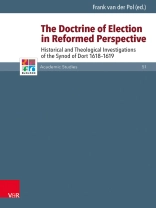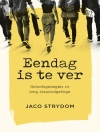In 11 essays The Doctrine of Election in Reformed Perspective reflect ongoing investigations concerning the doctrine of election, with special focus on the Synod of Dort 1618–19. Important lines of demarcation between different Reformed orthodox groups and denominations find their root divergence, as well as historical concentration point, in relation to this very issue. The ongoing research presented in this collection can open up a fresh field of fertile investigation for theological discussion. Moreover, she may lead to interdisciplinary perspectives and a cooperative approach to research, also beyond the field of theology. For this too is the field of philosophers and historians, those who trace the history of Christianity or are studying early modern Europe.
The volume consists of three sections. In the first Part three essays reflect historical and philosophical issues before the Synod of Dort. Part Two explores aspects of the Synod of Dort itself. The focus in Part Three is on the reception of the Synod of Dort. Finally, the following question is answered: How were the Canons of Dort regarded in the 17th–19th century, and what does the history of their editions tell us?
The editor, Frank van der Pol, was the program leader of the combined research group Early Modern Reformed Theology (EMRT) of the theological universities Apeldoorn and Kampen. In cooperation with the A Lasco Bibliothek Emden the EMRT organized an international conference on Oct. 29 and 30, 2014 about the doctrine of election in reformed perspective. The researchgroup is convinced that the dual line of research on history and theology of the Reformation tradition must continue and be strengthened. On the occasion of the 400th anniversary of the Synod of Dort, the researchers, wanting to do their work in a broader context with a wider dialogue, make their proceedings accessible for more people and institutes by publishing them in this volume.
Om författaren
Prof. Dr. Siegrid Westphal ist Inhaberin des Lehrstuhls für Geschichte der Frühen Neuzeit an der Universität Osnabrück sowie Direktorin des Forschungszentrums Institut für Kulturgeschichte der Frühen Neuzeit.












